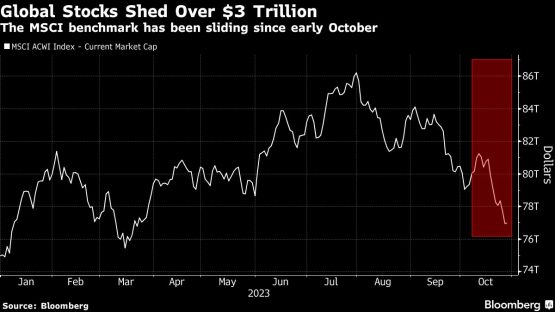Oil slipped with gold and government bonds as demand for haven assets eased after Israel’s military action in Gaza proceeded more cautiously than had been anticipated.
Brent crude dropped below $90 a barrel after rising by almost 3% on Friday, while WTI fell toward $84. S&P 500 futures contracts gained 0.3% after the gauge fell 0.5% on Friday, with risk appetite dented over worries including a persistently hawkish Federal Reserve and underwhelming corporate earnings.
ADVERTISEMENT
CONTINUE READING BELOW
The dollar was little changed against major peers, while the 10-year Treasury yield rose more than three basis points. Gold slipped but remained above $2,000 an ounce, and Australian bond yields edged higher.
“As the conflict in the Middle East continues, we are on watch for a collision course between tight financial conditions and geopolitically driven risk aversion,” Eric Robertsen, global head of research and chief strategist at Standard Chartered Plc, wrote in a note to clients. “For the moment, it is rates volatility that is driving outflows from emerging market assets and developed market equities.”
Australian, Japanese and Hong Kong equities fell. Shares of China Evergrande Group slumped even as the world’s most indebted developer got more breathing room Monday when a Hong Kong court adjourned a winding-up hearing to Dec. 4. Judge Linda Chan in Hong Kong’s High Court on Monday said “this is really the last adjournment,” the latest in a series of delays since the proceedings began last year.
Hong Kong’s Hang Seng index were down 0.28% in the morning as Chinese banks weighed. Bank of Communications dropped as much as 5.8% in Hong Kong after its third-quarter net income declined 3% year on year, while ICBC fell as much as 1% in Hong Kong as analysts saw its earnings results as mixed.
Meanwhile China’s EV sector delivered some good news, with Great Wall Motor jumping 7.2% in Hong Kong after stronger-than-expected results.
The Shanghai Composite Index and China’s CSI Index are both rising for a fifth day.
HSBC Holdings Plc announced a further share buyback of as much as $3 billion following posting a pretax profit of $7.71 billion, falling short from analysts estimated.
Middle Eastern markets that opened on Sunday showed little sign of panic a day after Israel sent troops and tanks into the northern Gaza Strip. Israel’s TA-35 stock index rose 1.3%, trimming its loss to 11% since the Hamas infiltration on Oct. 7.
Instead of a massive ground invasion, the Israeli military has started slowly, taking a day-by-day approach based on casualties, concerns of the conflict spreading to Hezbollah in the north and internal political pressures on Prime Minister Benjamin Netanyahu.
ADVERTISEMENT
CONTINUE READING BELOW
“Israel’s ground offensive into Gaza will likely have limited long-term impact on asset markets, unless the conflict were to spread into other regions, such as Iran,” said Spencer Hakimian, founder of hedge fund Tolou Capital Management in New York.
The global stock market has lost $12 trillion in value since the end of July as concern mounts that central banks’ “higher-for-longer” interest-rate policies may tip the global economy toward a recession.
The VIX index, known as Wall Street’s fear gauge, has risen to above 21 from around 13 in mid-September, but remains below its mid-20s March highs when the collapse of several regional banks set off a market rout.
The week includes a slew of potentially market-moving events, including central bank meetings in Japan, US and the UK.
On Wednesday, the US Treasury Department will unveil its quarterly bond sales plan, an announcement that may determine whether the 10-year Treasury yields have the momentum to keep rising after surging to a 16-year high last week. The week will end with the US payroll report that may show job and wage growth slowed last month.
Key events this week include:
- China’s key financial policy gathering day, a rare closed door event led by Chinese President Xi Jinping, starts Monday
- Japan unemployment, industrial production, retail sales, Tuesday
- Bank of Japan rate decision, Tuesday
- China non-manufacturing PMI, manufacturing PMI, Tuesday
- Eurozone CPI, GDP, Tuesday
- US construction spending, ISM Manufacturing, job openings, Wednesday
- US Treasury quarterly refunding announcement, Wednesday
- Federal Reserve rate decision, Wednesday
- Bank of England rate decision, Thursday
- China Caixin services PMI, Friday
- Eurozone unemployment, Friday
- US unemployment, nonfarm payrolls, Friday
Here are some of the main moves in markets:
Stocks
- S&P 500 futures rose 0.3% as of 1:27 p.m. Tokyo time. S&P 500 Index fell 0.5% Friday
- Japan’s Topix fell 1.2%
- Australia’s S&P/ASX 200 fell 0.8%
- Hong Kong’s Hang Seng fell 0.3%
- The Shanghai Composite rose 0.2%
Currencies
- The Bloomberg Dollar Spot Index was little changed
- The euro was little changed at $1.0559
- The Japanese yen was little changed at 149.59 per dollar
- The offshore yuan was little changed at 7.3287 per dollar
Cryptocurrencies
- Bitcoin fell 0.8% to $34,316.5
- Ether fell 0.7% to $1,784.94
Bonds
- The yield on 10-year Treasuries advanced three basis points to 4.87%
- Australia’s 10-year yield advanced six basis points to 4.88%
Commodities
- West Texas Intermediate crude fell 1.5% to $84.22 a barrel
- Spot gold fell 0.2% to $2 001.59 an ounce
© 2023 Bloomberg

